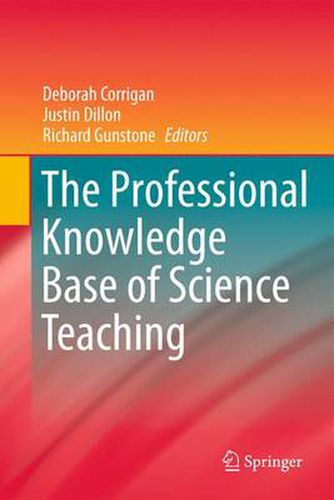Readings Newsletter
Become a Readings Member to make your shopping experience even easier.
Sign in or sign up for free!
You’re not far away from qualifying for FREE standard shipping within Australia
You’ve qualified for FREE standard shipping within Australia
The cart is loading…






This title is printed to order. This book may have been self-published. If so, we cannot guarantee the quality of the content. In the main most books will have gone through the editing process however some may not. We therefore suggest that you be aware of this before ordering this book. If in doubt check either the author or publisher’s details as we are unable to accept any returns unless they are faulty. Please contact us if you have any questions.
Over the past twenty years, much has been written about the knowledge bases thought necessary to teach science. Shulman has outlined seven knowledge domains needed for teaching, and others, such as Tamir, have proposed somewhat similar domains of knowledge, specifically for science teachers. Aspects of this knowledge have changed because of shifts in curriculum thinking, and the current trends in science education have seen a sharp increase in the significance of the knowledge bases. The development of a standards-based approach to the quality of science teaching has become common in the Western world, and phrases such as evidence-based practice have been tossed around in the attempt to measure such quality. The Professional Knowledge Base of Science Teaching explores the knowledge bases considered necessary for science teaching. It brings together a number of researchers who have worked with science teachers, and they address what constitutes evidence of high quality science teaching, on what basis such evidence can be judged, and how such evidence reflects the knowledge basis of the modern day professional science teacher. This is the second book produced from the Monash University- King’s College London International Centre for the Study of Science and Mathematics Curriculum. The first book presented a big picture of what science education might be like if values once again become central while this book explores what classroom practices may look like based on such a big picture.
$9.00 standard shipping within Australia
FREE standard shipping within Australia for orders over $100.00
Express & International shipping calculated at checkout
This title is printed to order. This book may have been self-published. If so, we cannot guarantee the quality of the content. In the main most books will have gone through the editing process however some may not. We therefore suggest that you be aware of this before ordering this book. If in doubt check either the author or publisher’s details as we are unable to accept any returns unless they are faulty. Please contact us if you have any questions.
Over the past twenty years, much has been written about the knowledge bases thought necessary to teach science. Shulman has outlined seven knowledge domains needed for teaching, and others, such as Tamir, have proposed somewhat similar domains of knowledge, specifically for science teachers. Aspects of this knowledge have changed because of shifts in curriculum thinking, and the current trends in science education have seen a sharp increase in the significance of the knowledge bases. The development of a standards-based approach to the quality of science teaching has become common in the Western world, and phrases such as evidence-based practice have been tossed around in the attempt to measure such quality. The Professional Knowledge Base of Science Teaching explores the knowledge bases considered necessary for science teaching. It brings together a number of researchers who have worked with science teachers, and they address what constitutes evidence of high quality science teaching, on what basis such evidence can be judged, and how such evidence reflects the knowledge basis of the modern day professional science teacher. This is the second book produced from the Monash University- King’s College London International Centre for the Study of Science and Mathematics Curriculum. The first book presented a big picture of what science education might be like if values once again become central while this book explores what classroom practices may look like based on such a big picture.